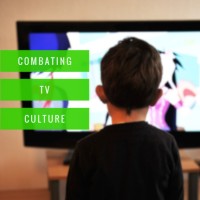 All you have to do is turn on the ole television to see a vast world of make believe. It’s a place where average kids become rock stars, travel around the world by themselves, live in penthouses, order unlimited online supplies, make up with friends every time, and work in cool places
All you have to do is turn on the ole television to see a vast world of make believe. It’s a place where average kids become rock stars, travel around the world by themselves, live in penthouses, order unlimited online supplies, make up with friends every time, and work in cool places
No doubt there are good messages—helping the poor, being kind to those different than you, studying and being smart is cool, etc.
But there are subtle and not-so-subtle negative messages tucked in too. I’m sure you’ve seen some slip into your household.
- A Case of the Gimmies—from both commercials and the characters themselves (my son wants the toys and my girl the clothes)
- Happily Ever After Mentality—everything from friendship troubles to lost dogs are solved in 30 minutes or less.
- Ugly Words (sometimes the big-time swear words)
- Disrespect for parents, siblings, teachers, etc.
- Little or no adult interaction
There are, of course the extreme reactions: absolutely no television or it’s opposing counterpart, total acceptance.
But how do we, as intentional parents, find a middle ground, combatting even the subtle influences? Especially when it enters our house, not through television itself, but through Trojan horse of school, neighborhood, and church friends.
- Watch what your kids watch.
This is kind of a no-brainer, but I’m guilty of missing this first step. You can’t know how to react if you don’t know what’s going on. Sit down and watch TV with your kids or at least be within hearing distance especially of small kids.
- Talk to your kids.
As with all problems, I’m a firm believer in communication. Review the shows your kids want to watch. Give them guidance about appropriate (and inappropriate shows).
But sometimes you’re caught off guard and a good show gives you a teachable moment. If you’re concerned about something you see or hear, point it out.
- When you see a family where the parents are absent, ask what your kids think about it. Ask whether the lifestyle is worth it or not.
- Point out the disrespect. Ask if they would want someone to treat them that way.
- When a TV friendship dilemma is solved easily, ask what ideas they might take to school with them.
- When a character is constantly getting new things, ask how realistic it is.
- Uncover the hidden worldview for yourself, and train your kids to see it too.
This one’s a little more complicated. But it speaks to the why behind the what and helps kids expand what isn’t okay all on their own. It’s the “what does this say about how the writer views the world” or even “how do they want your child to view the world”.
I’ll give you some examples to help you get your arms around this one.
Beyond the fact that it really isn’t okay for a child to travel around the world for months on end by themselves, what does the absence of adults say? Do we really need adults telling kids what to do?
Why are the girl characters so concerned about what they look like? What does their concern say about how they view themselves and the world?
Why do the writers crack the not-so-subtle sexual jokes? What does their inclusion say about how the writer views the world?
- Turn it off.
Sometimes a show is just unsalvageable, and it’s time to be the parent and turn the tube off. When that line is will be different for every child and every family. But know this, it’s okay to make your kids mad at you. It’s okay to embarrass them if necessary.
What are your favorite tricks, tools, and ideas to combat TV culture? [tweetthis display_mode=”button_link”]What are your favorite tricks, tools, and ideas to combat TV culture? @JanyreTromp[/tweetthis]
Comments? Questions? Leave them here. We’d love to hear from you.
Don’t miss a single Dove Parenting Blog. Subscribe to the Dove Foundation feed or monthly newsletter.




